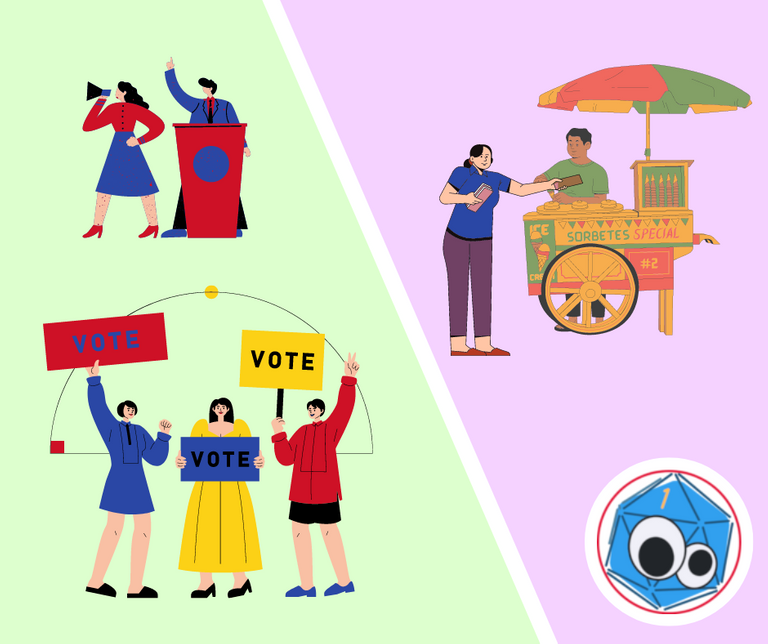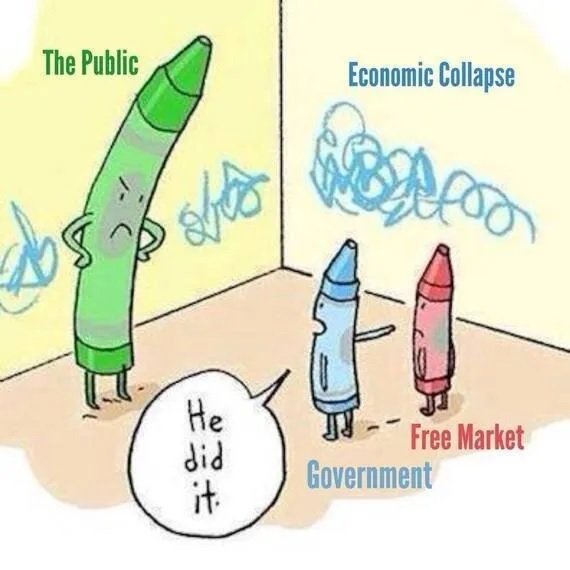One of the key tenets to the American civil religion is "consent of the governed." Similar sentiments are doubtless found in every government with any form of democracy. To support this claim, the chain of reasoning usually asserts governments were delegated authority by the people through the electoral process, where we are represented by the elected officials, and politics is our process of achieving consensus to serve the greater good.
I will attempt to honestly present the arguments I have seen in order to counter them without creating a strawman or moving the goalpost. If I failed to do so, please comment!
EDIT: I have also updated this post to include a point I lost while writing initially. Hopefully this isn't too poorly inserted after the fact.
Politics
Elections are a corrupt zero-sum game where people must win at the expense of someone else losing. It is also built around an artificial false choice made most obvious by the US two-party system, but still present with more parties in other regions. Ranked preferential voting is sometimes presented as a solution to such rigid partisanship, but it does not address the core issues. We are not asked to consent to this system, but we are told to comply with the outcome, and told our failure to participate means we can't complain.
Even when people acknowledge the failures of all candidates, we are told to choose the lesser evil for the greater good. Trying to choose the lesser evil is invariably still choosing evil, and "lesser" is mere conjecture. There is no abstract "greater good" which justifies supporting concrete evil, and politicians necessarily commit innumerable evils every day around the world. Political plunder is often advocated as a means of ensuring "social justice" today, yet cannot be legitimate property acquisition because it violates the principle of consent.
The incentives of politics encourage a rational ignorance in the populace. Each vote rounds to zero in all but the smallest municipal elections. The investment of time and energy required to gain the requisite knowledge in any one of myriad topics is disproportionate to the effect. It should not be surprising so many people rely on feelings and partisanship instead. A secret ballot also means elected official cannot definitively name a single supporter in their district. Those who voted for the winner cannot even claim any agent/principal relationship. Meanwhile, those who opposed the winner, did not vote, or could not vote cannot rationally be represented in the slightest. Elections thus unavoidably mean government by usurped authority over a broadly ignorant populace.
If you voted, maybe you can complain when a politician fails to represent your principles and beliefs, but you wanted a government, and you got one good and hard. I did not vote. I do not consent. I challenge the claims of authority and point out the injustice of compliance under duress because the nature of the State must not be hidden behind their veneer of democratic legitimacy.
Markets
Many who adhere to the idea that electoral politics is peaceful consent also assert that markets are inherently exploitative and coercive. Offers to employ workers are violence, and offers to sell are authoritarianism. This is an absurdly distorted perspective I find difficult to comprehend, but it has its adherents, and it provides a good contrast.

Consumption requires prior production. Poverty and starvation are the default state of nature. History is a record of people striving to secure reliable food, water, and shelter. Absent the saved wealth made possible by property norms and encouraged by free market trade, we would revert to abject poverty almost immediately. The usual counterarguments seem to be that if I am withholding something the other needs to live, e.g. food or shelter, I am necessarily in a position of undue power; and that the limited quantity of land for various purposes means newcomers are excluded from the source of wealth, that is, the land itself. This is equated with, "comply or die." I contend that this builds a strawman instead of addressing the real circumstances.
If I offer an exchange, you are free to accept, decline, or negotiate. This is mutual respect for the other's right to consent. There is nothing inherently coercive. In fact, the realization that others want both necessities and luxuries is an incentive to proactively invest toward serving those wants. The only way I can gain in the free market exchange is by providing a benefit others want in turn. This is not a zero-sum game, and whether I act out of virtue or vice, the result is more goods and services being made available to consumers.
Competition is depicted as cutthroat violence, but people are competing in the market to serve consumers better, and to reach different under-served markets to meet unmet demands. This is constructive, nor destructive. This is in direct contrast to politics, where every act boils down to, "comply or die." Even in the case of necessities, competition is to provide more food, cleaner water, and more comfortable shelter for consumers. This also has the effect of driving prices down toward the level of costs, because massive profits signal an unmet demand and provide an incentive to compete and serve that demand by increasing supply and reducing prices unless there is political intervention to protect the profit margins of corporate interests.
The next common claim is that such competition trends toward inevitable monopoly, but this is not something we see arising from market action. While it is true that the providers on the margin are more vulnerable to market changes, there are also diverse consumers with differing desires creating opportunities for small businesses able to adapt and innovate. As businesses grow to serve more and more such groups, the bloating bureaucracy and logistical challenges tend to create inefficiencies, and slow response to ever-changing markets. Only political protection sustains the modern mega-corporation model. This is also why corporate lobbyists are such a significant factor in government. These businesses are creatures of politics, not the market.
Greed is also commonly cited as a refutation of free market capitalism, but greed is a fundamental human vice since prehistory, not an attribute conjured up by the merchant class. There is also a modern paradox where people are praised for greedily voting for political coercion in their self-interest, but condemned for seeking voluntary exchange and demanding to keep what they earned. Any system of centralized power draws the vicious more than the virtuous. In democracy, the greediest tend to run for office while appealing to the common greed of the electorate. Under state communism, greed drove party leaders to plunder the peasantry, and they used accusations of greed to drive wedges between their victims, like when they blamed the Kulaks or other "reactionaries" of greed whenever their schemes failed. Monarchies greedily built feudal societies around plunder and serfdom. Nomadic tribes greedily waged war over land and resources. Every political and economic system must contend with greed. Many like to misquote 1 Timothy 6:10 and assert that money is evil. Money itself is not inherently evil, and the verse merely uses the example of money to condemn greed. There is nothing unnatural, exploitative, or corrupt about requesting value for value in an exchange. If anyone is exploiting anyone, it is the consumer who did not need to first produce what someone else offers for exchange. Money merely simplifies such exchange by solving the coincidence of wants problem of barter while creating a grassroots information network though prices.
Lastly, both right-wing nationalists and left-wing socialists tend to equate property and authoritarianism, albeit from opposite angles. To the nationalist, government borders are equivalent to property lines, so immigration is criminal trespass. To many a socialist, property claims are an unjust form of micro-statism where the individual claims totalitarian power, although some try to differentiate between the legitimate "personal property" and illegitimate "private property" based on various scales and uses. What matters to advocates for laissez-faire is first use and voluntary trade. Scale is irrelevant. This exclusionary principle is often condemned as coercive, but such arguments seem to be the same false equivalency as when self-defense is equated with assault. I have also seen assertions that because the Earth is ancient, this fact alone refutes any property claim. It is certainly true we inhabit this world for but a moment, but that has no bearing on the concept of ownership and exchange, which merely defines right-of-use in scarce resources to prevent conflict.

Nothing in free market philosophy precludes voluntary communes, syndicalist co-operatives, or other such arrangements people may choose. In fact, if those systems can out-perform the traditional employer/employee and buyer/seller business structures, they should be the inevitable mainstay of a transformed economy. Advocates of such systems should therefore have nothing to fear from laissez-faire.
This is not to say there aren't problems, but free people able to freely experiment, adapt, and compete are an effective way to quickly solve problems. The market is an emergent order as individuals respond to changes in supply, demand, prices, and technology and trends toward a new equilibrium with each change.
Conclusion
Where we see the worst problems becoming entrenched is where politics is involved. Corporations are legal fictions created under government law. Regulations sold to the public as safeguards invariably turn out to be written by established interests to restrict competition and consumer choice. Taxes are always pitched as "making the rich pay their fair share," but costs tend to get passed down to the consumer, and now we live in a world where governments want to monitor every exchange to extort a cut. Corporate cronies benefit from protectionism, subsidies, bailouts, and other special privileges at taxpayer expense. Politicians also promise welfare, health care, universal basic incomes, and other schemes of wealth transfer to buy support from the populace at large.
“Government is the great fiction through which everybody endeavors to live at the expense of everybody else.”—Frédéric Bastiat, Government (1848)
Government is always fundamentally coercive despite the myth of democracy, and all the vices which are claimed as a refutation of liberty are even more a refutation of state power. The free market does not guarantee virtue, but it is built on a foundation of individual consent, no matter how much people attempt to argue otherwise. This does not prevent vice, but it does tend to temper greed by diverting the urge to acquire into an incentive to provide value in exchange.

Image 2: source


I am very late to this post but what a great read.
There is nothing inherently coercive in free trade if you base your assumptions on both parties being on an equal power balance and abundance of supply. If take this to an extreme example: If there are only a few water suppliers in the world who control most of the supply and they want to charge you 10$ for a water bottle, what options do you have? It might not be coercive per se (use of force) but you are forced into a decision.
I agree with the view of @valued-customer, there is no possibility of free markets existing without a government that protects the interest of those participating in exchanges. It is a difficult problem to solve, when power taints politics and hence skews the markets. That is something that we saw very clearly in 2008, when big banks who went bankrupt were bailed out by governments. However, individuals who couldnt pay their mortages were kicked out from their homes. Basically business bankruptcy was protected but not individual bankruptcy.
There is much to talk about this topic. I hope I can write a blog post soon and have some debate about if "free markets" could trully free. I agree with your conclusion that markets are corrupt by politics. The problem is that politics are corrupt by markets as well, its a never-ending cycle where only a few benefit. I still see governments as necessary because we will never have a free-market where the basic assumptions are met and inbalances in power are not created. This is a very idylic view which in a practical view can probably never be met.
Cartels and monopolies as you describe don't survive without government protection.
Governments operate entirely by plunder and coercion. They do not protect free markets.
Voluntary exchange only occurs when both parties perceive a benefit according to their respective value scales. That is the defining feature of free market exchange. Consent is the core principle, regardless of our opinions as third parties.
I saw an interesting color code for activities referred to as "markets."
The white market is legal and moral. This is where most of us spend most of our lives.
The gray market is illegal, but not immoral. Working for cash under the table, for example. In the absence of political regulation and mandates, this would be no different from the white market. The only shadow is the threat of state violence.
The black market is illegal, and overlaps both the gray and red markets depending on context. In the case of vice, I argue that vices still are not crimes, and self-destruction should be discouraged, but not outlawed.
The red market is illegal and immoral. Assassination, slavery, forced prostitution, racketeering, than sort of thing. It overlaps with the black market and politics.
Politics is plunder and murder with a veneer of legitimacy. No more, no less. Saying "the market" corrupts politics conflates the realm of political plunder with the realm of voluntary exchange. It's like saying Lockheed-Martin and Raytheon are legitimate free market enterprises because you can buy stock in them.
I have a very different view than you and I would need long blog post to detail exactly my thoughts in a structured manner. I hope to be able to put it out next week, would love to hear your thoughts on it when its done
I'm open to discussion, especially if it's civil and honest. It certainly doesn't help when politicians and their propagandists pay lip service to both laissez-faire and socialism to justify de facto corporatism, militatism, and fascism.
This is an extraordinarily lucid consideration of the difference between an actual free market and government. However, as you may note, neither an actual free market exists when regulation by government intrudes, nor does government fail to suffer corruption by market forces.
Well said, and I agree.
Regarding real property, which you mention peripherally, I have had several properties stolen by fraud through fascism, the partnership of government and corporations, specifically Citi. It is notable that when political solutions do not exist, other solutions will be undertaken. I will not purchase real property, will not use banks, and etc., because I have learned that these are not trustworthy mechanisms to secure wealth. They are vectors for fraud.
Humans are animals. We are aspects of the ecosystems in which we fill roles in the flow of nutrients and energy. We depend on plants and in turn plants depend on us for water, air, and food. We have natural habitat that is our inherent right as natural aspects of the wild ecosystems we are part of. There is a rational balance between the property rights society reckons necessary to civilization, and our inherent nature as animals that create and require habitat. Just as beavers claim streams and create ponds by their labors, we create hamlets, villages, and cities.
No one would claim that beavers do not have a right to travel from their ponds and establish new lodges and dams, and neither is there any just and lawful claim that people are subjugated to prior claims of rural and wildland ownership. I cannot specify under which particular terms that dichotomy between natural habitat and private real property balances, but there is a balance, and it is not today maintained reasonably.
Therefore I assert it is up to me to do what is right as best I can to live free and justly, and none but enemies of life itself oppose my lawful acts to do so.
Food, I hope, for thought.
Thanks!
Congratulations @jacobtothe! You have completed the following achievement on the Hive blockchain and have been rewarded with new badge(s):
Your next target is to reach 46000 upvotes.
You can view your badges on your board and compare yourself to others in the Ranking
If you no longer want to receive notifications, reply to this comment with the word
STOPTo support your work, I also upvoted your post!